Ready for an adventure? Let’s venture into the wild wonderland of Vermont, where every hunting trip is a thrilling treasure hunt! Take in its expansive forests teeming with white-tailed deer and still lakes that mirror the waterfowl flight. This hidden gem offers more than just game – it’s about immersing yourself in nature’s awe-inspiring show. So lace up your boots and join us on this incredible journey through Vermont’s untamed beauty!
In this complete guide, we have covered everything you need to know about hunting in Vermont. You will find what types of animals can you hunt here, where to find them, hunting seasons, and license information right here.
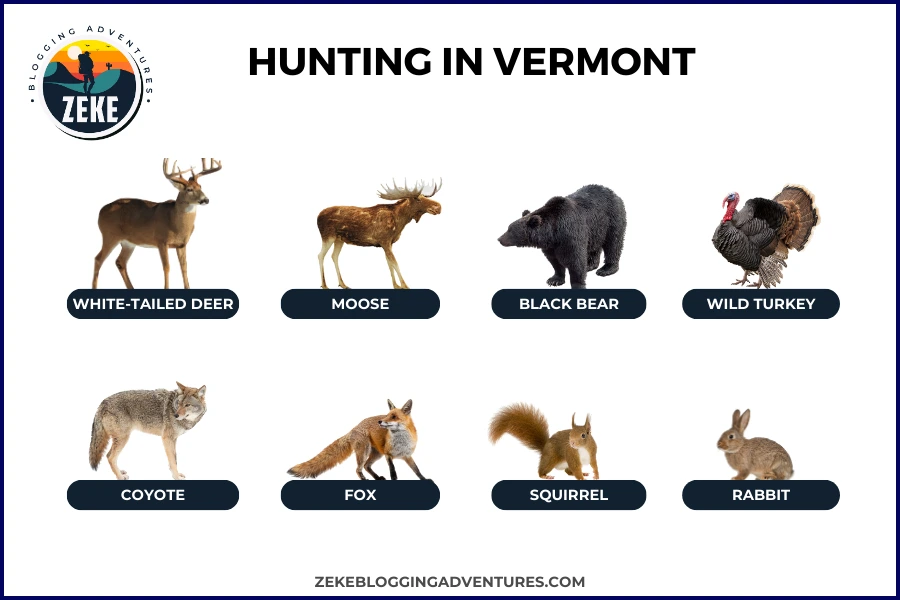
What Can You Hunt in Vermont?
Hunting in Vermont requires the right permits and being mindful of the season. Big game species like deer, moose, and black bear are popular targets, while waterfowl hunters can aim for ducks and geese during open seasons.
If you’re after smaller game, turkey, grouse, snowshoe hare or furbearers like beavers, foxes, and raccoons provide plenty of options. Before embarking on your hunt though, make sure to check with the Vermont Fish & Wildlife Department for all relevant regulations.
White-tailed Deer
Vermont is home to an abundance of white-tailed deer, with over 120,000 individuals roaming its forests and fields. These graceful creatures captivate us with their iconic white tails and impressive antlers. Hunting these majestic beasts has become a beloved tradition in Vermont for its diverse habitats and thrilling challenge – they are known to be swift runners as well as having an incredibly sharp sense of hearing!
If you’re looking for the ultimate hunting experience in Vermont, look no further than the white-tailed deer. While it can take some skillful maneuvering to get close enough for a shot at one of these elusive animals, nothing quite compares to that feeling when you finally spot one and make your move.
That being said, we want everyone who hunts here to do so responsibly; there are strict regulations set by the state’s Fish & Wildlife Department regarding bag limits per season which must be followed in order to maintain sustainable management of our population. It’s up to all hunters – both experienced ones and beginners just starting out alike respect this valuable resource so future generations may enjoy it too!
White-tailed Deer Season Vermont
| Season | Dates |
| Archery (Closed in Nov) | Oct 01 – Dec 15 |
| Muzzleloader | Dec 02 – Dec 10 |
| November Regular | Nov 11 – Nov 16 |
| Muzzleloader Antlerless | Oct 26 – Oct 29 |
| Novice Weekend | Oct 21 – Oct 22 |
| Youth Deer Weekend | Oct 21 – Oct 22 |
Moose
Hunting moose in Vermont can be an incredible experience for those eager to take on the challenge. These animals have a sharp sense of smell and are highly intelligent, making them difficult to track down, and requiring skillful patience from hunters. But when you finally get your hands on one, it’s truly an incomparable feeling.
Fall is the best time for hunting these majestic creatures as they become more vocal and active during mating season (October-November). Don’t forget that Vermont only allows licensed hunters out after moose so make sure all your paperwork is up to date before setting off into the woods.
When it comes to equipment, ensure you have a powerful rifle with enough stopping power and some camouflage clothing – blending in with your surroundings is key! A good pair of binoculars will also help spot them from further away. And don’t underestimate the terrain; thick forests and marshy areas provide excellent cover but expect plenty of tough hiking while tracking through rough terrain.
Fortunately, due to successful conservation efforts over recent years, there has been a steady growth in the population meaning there are plenty of opportunities available for people wanting this once-in-a-lifetime experience.
Moose Season
| Season | Dates |
| Regular | Oct 14 – Oct 20 |
| Archery | Oct 01 – Oct 07 |
Black Bear
At an estimated 7,000 – 8,500 strong, the black bear population in Vermont is thriving. These majestic creatures have a unique look due to their ebony coats which can range from jet-black to cinnamon brown and white patches on their chests.
Green Mountain National Forest is one of the best spots for viewing these bears as they feast on berries, nuts, and insects while also scavenging small mammals or carrion when food sources are scarce. Hunting them requires great skill and patience as they’re intelligent with a sharp sense of smell, making them difficult targets.
Bear hunting season runs from September through November each year, at which time permits must be obtained along with following all relevant regulations set by the Vermont Fish & Wildlife Department; it’s essential that hunters follow these guidelines for sustainable practices that help protect our beloved bears!
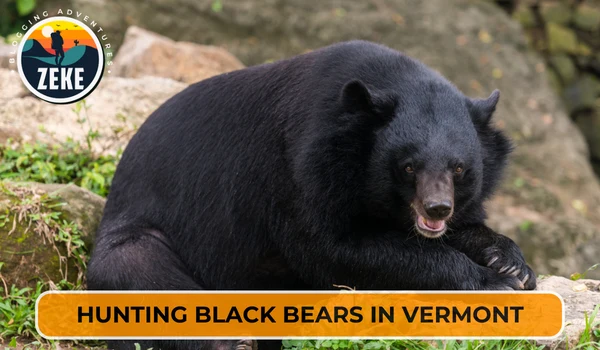
Black Bear Season Vermont
| Season | Dates |
| Early Season | Sep 01 – Nov 10 |
| Late Season | Nov 11 – Nov 19 |
Wild Turkey
The lush Vermont forests and hills create the ideal habitat for wild turkeys, providing a great opportunity for hunters to bag some impressive trophy birds. With over 800,000 acres of public land available across both spring and fall seasons, there are plenty of chances to spot these elusive creatures. Whether you prefer bow or shotgun hunting, Vermont has something special just waiting for all types of hunters!
Not only does this state offer an extended season, but it also provides a one-of-a-kind experience with fresh air and breathtaking scenery. For those looking to make their trip even more memorable, take home some delicious wild turkey meat that is lean yet flavorful; truly a delicacy like no other.
Turkey Season Vermont
| Season | Dates | Bag Limit |
| Spring | May 01 – May 31 | 2 Bearded Turkeys |
| Fall (Archery) | Oct 07 – Oct 20 | 1 Turkey (Either Sex) |
| Fall (Archery/Shotgun) WMUs B, D, G, H, I, J, L, M, O, P, Q | Oct 21 – Oct 29 | 1 Turkey (Either Sex) |
| Fall (Archery/Shotgun) WMUs F, K, N | Oct 21 – Nov 05 | 1 Turkey (Either Sex) |
| Youth and Novice Weekend | Apr 27 – Apr 28 | 1 Bearded Turkey |
Coyote
Coyotes are incredible creatures, renowned for their adaptability and tenacity. They thrive all over North America in almost any habitat – from dense forests to open fields here in Vermont, you can spot them most commonly along the Connecticut River or throughout the Champlain Valley.
Their vocalizations are particularly interesting; by howling and tipping, they coordinate hunts as well as establishing territory and finding mates. Coyotes are opportunistic predators with an omnivorous diet that consists of small mammals, birds, insects fruit, and vegetables — but this does bring them into conflict with farmers who have livestock such as sheep or chickens which may become preyed upon if not properly protected.
Hunting coyotes is legal year-round in The Green Mountain State since they’re considered non-game animals – however, it’s still important to make sure you get a hunting license before going out after one!
Coyote Season
| Species | Dates |
| Coyote | Jan 01 – Dec 31 |
Rabbit
Vermont’s abundance of rabbit population makes it an ideal destination for the avid hunter. From rolling hills to dense forests, these swift and agile creatures can be found all over the state. It’s a game of cat and mouse as they dart around their environment trying to stay hidden from view – making them quite challenging targets.
That’s why having the proper equipment is essential; you want something that offers precision accuracy at both short-range or long-distance shots like a shotgun with birdshot or a .22 caliber rifle.
You also need patience as rabbits are most active during dawn and dusk when they come out to feed on vegetation so look out for fresh tracks or droppings which could indicate recent activity nearby. All this combined will give you your best chance at success while hunting rabbits in Vermont!
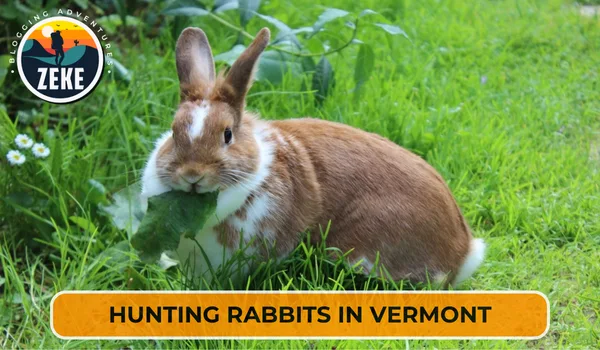
Rabbit & Hare Season
| Species | Dates | Location |
| Cottontail & Snowshoe Hare | Sep 30 – Mar 10 | All WMUs except D & E |
| Cottontail & Snowshoe Hare | Sep 30 – Mar 31 | WMUs D, E |
Fox
Fox hunting can be an exhilarating experience in Vermont with its stunning landscapes and abundant wildlife. To be successful, you must possess the skills of patience and stealth. Concealing yourself through proper camouflage and scent control is paramount for a successful hunt.
Calling techniques are also key for luring foxes to your location by imitating distress or mating calls from other animals; alternatively, you can use your own vocal cords to attract them. Spot-and-stalk hunting is another viable option, where one patiently watches areas commonly inhabited by these cunning creatures before taking precise shots when spotted – always within range of expertise.
It’s important to make sure that all necessary permits and licenses have been obtained prior to any fox hunt as regulations vary depending on the area in Vermont; it’s also good to show respect for property boundaries at all times when out there hunting in Vermont!
Fox Season
| Species | Dates |
| Red Fox, Gray Fox | Oct 22 – Feb 12, Oct 28 – Feb 11 |
Squirrel
At first glance, Eastern gray squirrels may look harmless with their fluffy gray fur and bushy tails. But don’t be fooled – these agile little critters can prove to be a tough challenge for any hunter! The best way to spot them is by visiting the maple trees that dot Vermont’s landscape; they love munching on the sweet sap found there and have no problem blending in with its branches.
For those looking to hunt squirrels in this state, patience is essential. While it may take some time, when you finally do get that shot off after patiently waiting for your perfect opportunity, it’ll feel like an awesome rush of adrenaline. Just make sure you remain as quiet and still as possible – one wrong move could send these skittish animals bolting away from your sights before you know it.
Squirrel Season Vermont
| Species | Dates |
| Gray Squirrel | Sep 01 – Dec 31 |
Bobcat Season
| Season | Dates |
| Bobcat | Jan 10 – Feb 07 |
Mink Season
| Season | Dates |
| Trapping Season | Oct 22 – Dec 31 |
Muskrat Season
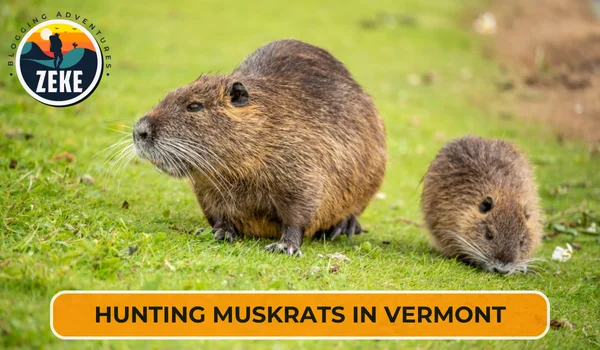
| Species | Dates |
| Muskrat | Mar 20 – Apr 19 |
Raccoon Season
| Species | Dates |
| Raccoon | Oct 08 – Dec 31 |
Weasel Season
| Season | Dates |
| Trapping Season | Oct 22 – Dec 31 |
Opossum Season
| Season | Dates |
| Trapping Season | Oct 22 – Dec 31 |
Beaver Season
| Season | Dates |
| Trapping Season | Oct 28 – Mar 31 |
Fisher Season
| Season | Dates |
| Trapping Season | Dec 01 – Dec 31 |
Skunk Season
| Season | Dates |
| Trapping Season | Oct 22 – Dec 31 |
Crow Season
| Species | Dates |
| Crow | Jan 20 – Apr 11, Aug 25 – Dec 18 |
Woodcock Season
| Species | Dates |
| Woodcock | Sep 24 – Nov 07 |
Duck Season
| Season | Dates |
| Connecticut River Zone | Oct 04 – Nov 06, Nov 23 – Dec 18 |
| Interior Vermont Zone | Oct 15 – Dec 13 |
| Lake Champlain Zone | Oct 15 – Oct 23, Oct 29 – Dec 18 |
Merganser & Coot Season
| Season | Dates |
| Connecticut River Zone | Oct 04 – Nov 06, Nov 23 – Dec 18 |
| Interior Vermont Zone | Oct 15 – Dec 13 |
| Lake Champlain Zone | Oct 15 – Oct 23, Oct 29 – Dec 18 |
Scaup Season
| Season | Dates |
| Connecticut River Zone | Oct 04 – Nov 06, Nov 23 – Dec 18 |
| Interior Vermont Zone | Oct 15 – Nov 03, Nov 04 – Dec 13 |
| Lake Champlain Zone | Oct 15 – Oct 23, Oct 29 – Nov 08, Nov 09 -Dec 18 |
Goose Season
| Season | Dates |
| Canada Goose Connecticut River Zone | Sep 01 – Sep 25, Oct 04 – Nov 06, Nov 23 – Dec 18 |
| Canada Goose Interior Vermont Zone | Sep 01 – Sep 25, Oct 15 – Nov 13, Dec 01 – Jan 21 |
| Canada Goose Lake Champlain Zone | Sep 01 – Sep 25, Oct 15 – Nov 13, Dec 01 – Jan 21 |
| Canada Goose (Applies to land, not CT River waters) | Dec 19 – Jan 21 |
| Snow Goose Connecticut River Zone | Oct 04 – Dec 18 |
| Snow Goose Interior Vermont Zone | Oct 01 – Dec 31, Feb 26 – Mar 10 |
| Snow Goose Lake Champlain Zone | Oct 01 – Dec 31, Feb 26 – Mar 10 |
| Snow Goose (Applies to land, not CT River waters) | Mar 11 – Apr 23 |
| Conservation Order Lake Champlain Zone | Mar 11 – Apr 23 |
| Conservation Order Interior Vermont Zone | Mar 11 – Apr 23 |
Brant Season
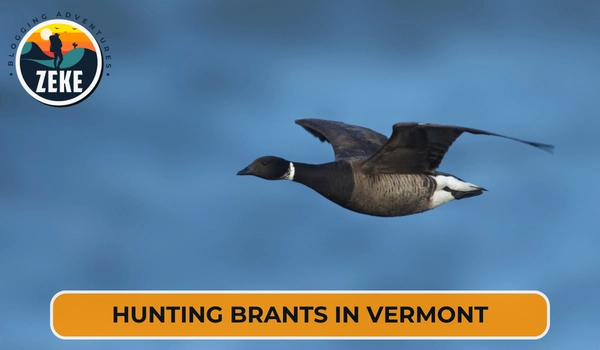
| Season | Dates |
| Connecticut River Zone | Oct 04 – Nov 06, Nov 23 – Dec 08 |
| Interior Vermont Zone | Oct 15 – Dec 03 |
| Lake Champlain Zone | Oct 15 – Dec 03 |
Grouse Season
| Season | Dates |
| Ruffed Grouse | Sep 24 – Dec 31 |
Snipe Season
| Season | Dates |
| Wilson’s Snipe | Sep 24 – Nov 07 |
Vermont Hunting License Information
Hunting in Vermont requires a valid license, no matter if you’re a resident or not. Don’t let the process intimidate you though; getting your hands on one is simple. You can purchase an annual license or just go for temporary depending on how long you’ll be staying in the state.
Residents don’t need to worry about much – all they have to do is prove residency with something like their driver’s license and they can buy it online or from any authorized seller. Non-residents also get this luxury of convenience when obtaining their permits either through internet sites or legal vendors around Vermont.
Bear in mind that age restrictions apply too: residents must be at least 12 years old while non-residents should meet 15 years minimum before buying a hunting pass here. But kids under twelve are still allowed to hunt as long as they’ve got an adult who has already obtained his own valid permit close by them during these activities.
In Vermont, an annual resident hunting license costs $28 while a non-resident hunting license will set you back $102.
Besides having the necessary paperwork, hunters must complete hunter education classes that cover firearm safety and wildlife conservation among other topics – even experienced shooters should join those courses for extra knowledge. Always comply with the Fish & Wildlife Department’s regulations so everyone stays safe out there; both animals and people alike.
Where Can You Hunt in Vermont?
The Green Mountain State is known for its lush and stunning forests. An impressive variety of animals, from large game like deer, moose and bear to small critters like rabbits and squirrels call these woods home. The Green Mountain National Forest or the Northeast Kingdom are popular spots for hunters looking for a true wilderness experience.
If you’re more into waterfowl hunting, Vermont offers plenty of lakes, ponds and rivers that will appeal to any duck or goose enthusiast – Lake Champlain being a prime example due to all the different habitats it has available.
For an even bigger challenge head up into the Green Mountains where moose and black bears roam free! Don’t forget about wild turkey either; they can be found in both woodlands as well as open fields throughout the state.
Public Hunting Places in Vermont
Green Mountain National Forest
At the heart of Vermont lies Green Mountain National Forest, a sprawling 400,000 acres of lush terrain. Boasting an array of wildlife like deer, moose, bear and small game such as rabbits and squirrels – it’s no wonder why this area is one of the most sought-after hunting spots in the state.
With over 100 designated public land areas spread out across its vastness, there are plenty of places to explore for novice or experienced hunters alike. And with valid permits and licenses, you can access these secluded areas year-round.
What sets Green Mountain apart from other popular destinations is its dedication to conservation efforts; it strives to maintain thriving populations while simultaneously preserving natural habitats for all species living within its boundaries.
For those looking for gear or equipment before embarking on their journey through the Green Mountains – fear not! There are numerous local sporting goods stores nearby where you can find what you need along with campsites available if you prefer more rugged outdoor adventures overnight stays.
Missisquoi National Wildlife Refuge
Hunting at Missisquoi National Wildlife Refuge is an adventure like no other, but it’s also responsible. The US Fish and Wildlife Service has set strict regulations to maintain sustainable hunting practices while protecting the natural environment for wildlife.
Missisquoi stands out as one of the best waterfowl hunting spots in New England. With over 7,000 acres of wetlands and open water, this refuge boasts a plethora of waterfowl – ducks, geese, and even swans in certain seasons!
And if you’re keen on some upland game bird hunting – pheasants or grouse perhaps? You won’t be disappointed either. If that doesn’t excite you enough, white-tailed deer can also be found within its boundaries – big game action awaits!
Silvio O. Conte National Fish and Wildlife Refuge
Nestled among Vermont, New Hampshire, Massachusetts, and Connecticut lies Silvio O. Conte National Wildlife Refuge – a sprawling 31,000-acre oasis of diverse ecosystems ranging from rolling hills to dense forests. It’s no wonder why this refuge is sought after for its abundance of game species like deer, turkey, waterfowl, and small animals!
Silvio O. Conte stands out from the rest because of its commitment to conservation practices that are not only sustainable but also ensure our wildlife populations remain robust for generations to come; they collaborate closely with local agencies as well as communities so everyone can enjoy nature’s bounty responsibly.
Before starting your hunting adventure here at Silvio O., make sure you’re up-to-date on their regulations so you can have an enjoyable experience while keeping safety a top priority – always remember to practice sensible firearm handling and respect fellow hunters.
Willoughby State Forest
Willoughby State Forest is an outdoor paradise occupying over 7,000 acres of lush terrain. From hardwood forests to open fields and wetlands, wildlife abounds here, making this area a prime spot for hunters.
Deer are plentiful in the forest due to careful management practices which have made them thrive – with some impressive trophy bucks among them. Bear hunting also offers great opportunities as the thick cover and abundant food sources attract these animals in droves.
And turkey enthusiasts will not be disappointed either; rolling hills provide ideal spots for calling birds during both spring and fall seasons. If you’re looking for a challenging hunt with potential rewards like big game or gobblers, then Willoughby State Forest is your go-to destination!
Private Hunting Places in Vermont
In Vermont, there are many private hunting lands where you can hunt. Private hunting grounds are often owned by generous individuals or families who kindly allow hunters access. Before entering, be sure to get permission from the owner – not only is this polite but also safeguards against any trespassing mishaps!
Do your homework before setting out: specific rules may apply such as designated zones for hunting or particular time frames when tracking game. Familiarize yourself with what type of animals can be hunted as well as the licenses and permits needed for proper legalities.
When on private property, always practice ethical and responsible behavior. No trace should remain once you’re done and all safety protocols must be followed in order to ensure a successful experience that everyone involved can enjoy!
